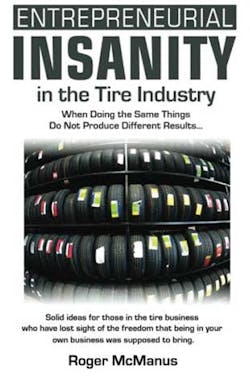True value
Tire dealers who own apparently successful businesses often are taken aback when it is suggested to them that their businesses are “worthless.” A softer way to say it would be to split the word and say their businesses are “worth less” than they could be.
In harsh reality, the first term may be more accurate.
Usually the owners of these successful businesses are right in the middle of the action. They keep a sharp eye on the details and product quality. They have a joyful relationship with customers and a ready answer for employees seeking counsel. And, odd as it might seem, those traits actually keep a business from being worth as much as it could.
Valuation model
The “legal” definition of value is, “the price at which a willing buyer and a willing seller agree.” The key word here is “willing.” No “fire sales.” No duress. No opportunistic gouging.
Businesses are sold every day where one party or the other is not on solid footing. But, in long-term planning, the key objective is to prepare your business for sale from the first day you open it.
It does not mean that you will sell it. It certainly does not mean that you have to sell it. But, if you have it ready to sell, it always has a value. Most people who say they don’t want to sell their businesses know, in their hearts, they have nothing to sell.
The truth be told, there are very few tire businesses on any given day that are “ready to sell.” Owners always want to clean up the place, increase sales a bit, make that big deal that really turns the corner, hire that key person who will make all the difference. You know, when the business is “ready.”
Success might be the problem
In the previous scenario, the successful owner of the business knows the customers intimately and is a ready source for employees who need answers. So, what happens when the owner is not there? Do sales go down because you are not personally there to help the customers who love you? Do employees slow progress by deferring decisions “until the owner gets back”? Your absence could dramatically impact the value of your business.
[PAGEBREAK]
Therein lies the challenge for the prospective buyer and seller.
As the seller, you cannot sell yourself. If the true value of the business is you, what is left is essentially tire balancers, air guns and odd-sized tires (equipment and inventory). The value of the enterprise is essentially liquidation value.
Being ‘finished’
Perhaps one of the most valuable images you can have comes from Tom Watson, former CEO of IBM Corp. He suggests that to get an idea of what your objective is, you only need to imagine what your business would look like when it is “finished.”
When all the parts are in place, it runs as smoothly as any business can run — when you are not “doing” or even “managing,” but owning a “finished” business. Your task is to simply work every day toward that image (see sidebar).
This is the very essence of making the shift from small business thinking to entrepreneurial thinking. The only way a business has a value is to make it worth something to someone else. Then, when you can sell it — but decide to keep it — you essentially bought it yourself. And that is because it is a good deal!
Roger McManus, a self-proclaimed “therapist for the entrepreneurially insane,” is a new contributor to Modern Tire Dealer. He is the author of “Entrepreneurial Insanity in the Tire Industry,” a new book that challenges business owners to examine why they opened their businesses and explore whether or not they are achieving the personal freedom that business ownership is supposed to deliver. “Entrepreneurial Insanity in the Tire Industry” is available through Amazon in print or Kindle in form; read more at www.thetirebusiness.biz, or visit his blog at www.ensanity.biz. You also can write him at [email protected].
